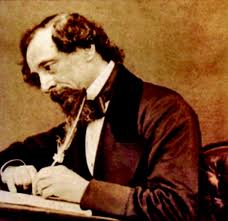A click-bait article in Forward a few years ago tried to argue the case that Dickens’s classic novel is filled with Jew hatred. That argument is full of holes, to be polite.
While the money lender may be an anti-Semitic stereotype and Scrooge does lend money, that’s just one of his many business dealings. The sign “Scrooge and Marley” hangs over a “warehouse door,” so money lending doesn’t seem to be his main profession. A warehouse suggests a wholesale business of some kind, though Dickens never specifies what that is. It’s not likely that the warehouse was packed with boxes of gold sovereigns and pound notes.
The second line of the novel tells readers that Scrooge would be trusted in any endeavor he turned to on the London Stock Exchange. Later in the book, it’s stock brokers on the Exchange whom he hears gossiping about his death. So we can assume Dickens was suggesting that Scrooge was somehow involved in stocks and bonds.
But wait–is Scrooge actually Jewish? The Forward article suggested that Dickens’s choice of Scrooge’s first name Ebenezer is clearly anti-Semitic. That’s laughable. Biblical names were widely given to Anglo-Saxon boys and girls in the 19th century. And some of them of them were uncommon ones like his: Hezekiah, Obadiah, Tabitha, Jemima.
While Ebenezer may mean something in Hebrew (“stone of help”), so what? Many much more widely-used English names like John and Mary are derived from Hebrew. If Scrooge had somehow managed to have a wife named Elizabeth, would that be anti-Semitic, too? After all, it comes from Elisheva (“God is abundance”).
The author of the article went on to note that Scrooge’s late partner has “a fully Jewish moniker” in Jacob Marley. Jacob is obviously the name of a Biblical patriarch, but then the author makes the blockbuster revelation that Marley is Hebrew for “it is bitter to me.”
That’s the point at which I thought I might need a glass of heavily-spiked eggnog. And I don’t even like eggnog.
I’ve read a number of Dickens biographies and haven’t encountered reports of Dickens knowing anything besides some French in addition to his native English, so how did he become a scholar in Hebrew?
Even if a trove of letters was discovered that proved Dickens was a secret student of the language, why would he bother camouflaging his antisemitism? It was open enough in books like Oliver Twist, Sketches by Boz, and David Copperfield.
But wait! Maybe there are more stunning secrets buried in Dickens’s novels! Perhaps Chuzzlewit is an anagram for something in Aramaic? Maybe we should be reading Bleak House backwards! And what if we’re about to see the publication of The Dickens Code by some enterprising author?! Is Tom Hanks already studying a script where he plays a Dickensologist?
Back on Planet Earth, it turns out that name Marley has a long history with no Jewish connections at all:
This long-established surname is of Anglo-Saxon origin, and is locational from any of the various places thus called, including Marley in Devonshire, Durham, Kent and the West Riding of Yorkshire, or Marley Farm in Brede (Sussex). The Yorkshire place, recorded as “Mardelai” in the Domesday Book of 1086, derives its first element from the Olde English pre-7th Century “mearth” meaning (pine) marten, plus “leah”, a wood or clearing.
It took me only a few minutes to track down that information. No tortured etymology necessary.
The Forward article made the final killing point–quoting another writer–that Scrooge hates Christmas and has a pointed nose. There you have it, ladies and gentlemen. To cap it all off, the author ends his article with “Bah, humbug,” which must have taken a great deal of thought.
In the course of A Christmas Carol, Scrooge comes to see how the world is filled with poverty, some of it close to home. And there’s that vision of Ignorance and Want which is absolutely harrowing.
Scrooge also realizes how his emotional life has been stunted, and shame makes him more compassionate. That’s not anti-Semitic or pro-Christian, and it has nothing to do with religion or identity: It’s just plain human.
An American pioneer in writing fiction about children of Holocaust survivors, Lev Raphael is the author of 27 books in genres from memoir to mystery.

